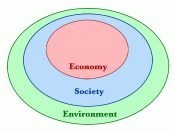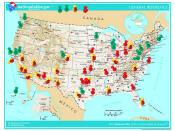Not Enough
Farming practices in the world are producing enough food as to sustain 8-10 billion people. This ability to produce food is essential to the well being of our society. As we continue to progress and eliminate more types of land without adopting practices that will result in sustainable resources the food production will dramatically decrease. In order to work toward a sustained ecosystem the policy makers and economists must understand the benefits that are associated with these sustained practices, and the policies that must be enacted to accomplish them. While we have currently adopted some practices that will encourage ecosystem sustainability, we are not doing enough.
The problems that face economists and policymakers as they try to create policy are broad. In order for policy to be created to help sustain such practices, there needs to be a definitive problem, yet the negative effects from improper land environmental use is too difficult to quantify.
The importance of biodiversity is especially difficult to understand for there is no quantifiable evidence that a lack of diversity is detrimental to an environment, but rather there is only evidence that biodiversity creates a stable and ever improving environment. It is not easy to understand that although we have in the past been able to increase production at a rapid rate, and now will no longer to continue that rate of improvement. Many environmentalists groups have helped the common person to understand these problems; the problem of the lack of the best land, or the increasingly ineffectiveness of phosphorous and nitrogenous fertilizers. These, along with the fact that a more specialized farm production leads to a loss of biodiversity, thereby greatly reducing the stability of an environment, are just a few of the issues that have helped to raise awareness of the sustainability...


